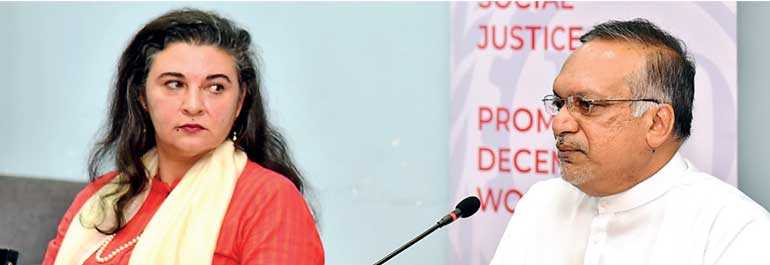Saturday Feb 14, 2026
Saturday Feb 14, 2026
Wednesday, 10 April 2019 02:07 - - {{hitsCtrl.values.hits}}

By Nuwan Senarathna
The Government has kicked off discussions on amalgamating as many as 40 different labour laws into one comprehensive legislative framework, to simplify employment among different sectors and improve economic competitiveness, a top official said yesterday.
Labour and Trade Union Relations Minister Ravindra Samaraweera, during a press conference to mark 100 years of the International Labour Organisation (ILO), told reporters that the Government was moving forward to create one comprehensive labour law and talks had already begun between different departments within the Ministry.
“There are more than 40 different laws pertaining to labour in Sri Lanka. Therefore our intention is to bring all of them under one law, but this will be done in a way that will not affect labour rights. Employees will not lose any benefits that they currently have,” Samaraweera said.
Samaraweera added that once the Ministry formulates the framework, the blueprint would be shared among stakeholders, including the private sector, trade unions, and public. At this point, ideas and responses would be collected to be incorporated into the new legislation.
“Once the Ministry formulates a basic structure of the law, we will discuss with all parties. We will not present it to Parliament or implement it without the agreement of all parties,” he assured.
Minister Samaraweera denied that the new laws would increase work hours and reduce maternal and other benefits, and stressed that the labour laws were not being changed for the need of any external organisation. He insisted that no guidelines have yet been established, and the entire process was still only at discussion stage.
Commissioner General of Labour R.P.A. Wimalaweera said the new framework will pave the way for unified benefits for all workers in Sri Lanka, ending the differences that existed between different sectors governed under different legislations.
“If we take the Shop and Office Act, that only addresses issues of office workers and workers in shops. Wages boards will only address issues of industry sector workers. But some of the workers in industry sectors do not come under this. That is why we want to bring one law, which addresses issues of all workers, that will also be easier to implement,” he said.
Many have called for Sri Lanka’s archaic labour laws to be reformed for years, as many of them are outdated and do not provide employers flexibility in hiring, retaining, or letting go of employees. The laws have also been cited as inhibiting start-ups and discouraging flexible work hours to attract more women into the formal workforce.
Occupational safety and health is covered for industrial workers in the Factories Ordinance No. 45, but there are no safety regulations for agricultural work. Because of different provisions in the Maternity Benefits Ordinance No. 32 and the Shop and Office Employees’ Act, maternity benefits, which should be uniform, are different for white-collar and blue-collar workers. While maternity leave is measured by the number of working days for shop and office employees, it is measured in ‘total days’ for factory workers. They also include different clauses for including holidays, and the need for nursing intervals.
In Budget 2018, the Finance Ministry outlined a list of laws that require change, including several labour laws, which the Government insisted is necessary for the economy to become more competitive.